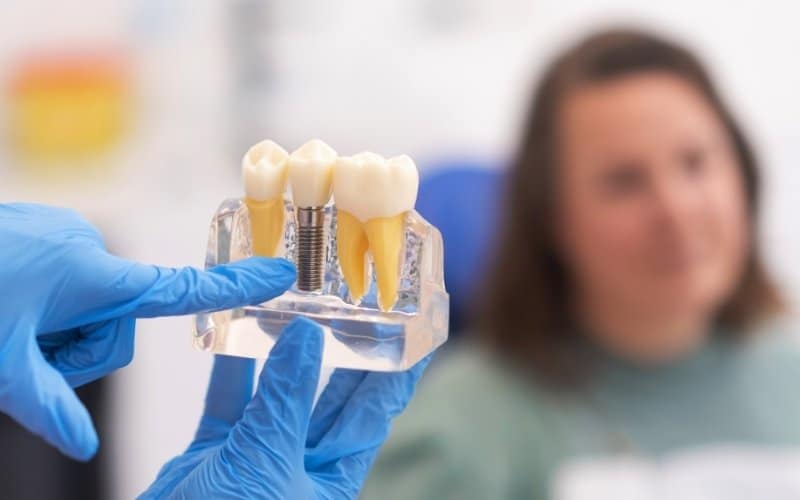Tooth loss affects millions of people, leading to a loss of confidence and quality of life. Studies show that missing teeth can impact social interactions and self-esteem. Dental implants offer a transformative solution, providing a permanent replacement for lost teeth. They play a crucial role in restorative dentistry by restoring functionality and aesthetics.
This blog explores the many benefits of implants and how they can help restore your smile.
Understanding Dental Implants
Implants are artificial tooth roots made of titanium, surgically placed into the jawbone. They consist of three main components: the implant itself, the abutment (which connects the implant to the crown), and the crown (the visible part of the tooth).
There are two primary types of dental implants: endosteal and subperiosteal. Endosteal implants are placed directly into the jawbone. In contrast, subperiosteal implants sit on top of the jawbone but under the gum tissue, which is suitable for patients with insufficient bone height.
The process of osseointegration is vital for the success of implants. During this process, the bone grows around the implant, securely anchoring it in place. This fusion provides a strong foundation for the crown, ensuring stability and durability. The result is a replacement that mimics the function and appearance of natural teeth, allowing individuals to smile confidently once again.
Benefits of Dental Implants
Dental metal posts provide numerous benefits, making them a popular choice for tooth replacement. From aesthetic improvements to functional advantages, they contribute to a higher quality of life for many individuals.
Aesthetic Improvements
One of the most significant benefits of implants is their aesthetic appeal. Unlike dentures or bridges, which can look artificial, implants are designed to mimic the look and feel of natural teeth.
The crown, made from porcelain or composite materials, can be custom-made to match the color, shape, and size of your existing teeth. This customization ensures that your smile remains uniform and natural-looking.
Moreover, because implants are anchored in the jawbone, they prevent the sunken facial appearance often associated with missing teeth, allowing individuals to regain their youthful appearance.
Functional Benefits
Dental implants significantly improve oral function, providing advantages that many tooth replacement options cannot. With implants, patients can enjoy the freedom of eating their favorite foods without discomfort or restrictions.
Unlike dentures, which may slip or shift while chewing, implants are securely anchored in place, allowing for a more stable bite. This stability enhances chewing efficiency, making it easier to break down food.
Furthermore, implants improve speech by eliminating the slurring or mumbling that can occur with missing teeth. Patients can talk with confidence, knowing their teeth won’t interfere with their ability to communicate effectively.
Longevity and Durability
When considering tooth replacement options, longevity is a crucial factor. Dental implants are known for their durability and can last many years, often a lifetime, with proper care.
Unlike bridges or dentures that may require replacements or adjustments over time, implants are designed to withstand the test of time. Their titanium roots fuse with the jawbone through a process called osseointegration, creating a strong and stable foundation.
Regular dental check-ups and good oral hygiene practices can further extend the lifespan of implants, making them a cost-effective solution in the long run.
Impact on Oral Health
Beyond aesthetics and functionality, implants are vital in maintaining oral health. One of the most significant benefits is their ability to prevent bone loss. When a tooth is lost, the jawbone can begin to deteriorate due to lack of stimulation. Dental implants stimulate the jawbone, helping to maintain its density and strength. This stimulation prevents bone loss that can lead to changes in facial structure over time.
Additionally, implants do not rely on adjacent teeth for support, preserving the integrity of your natural teeth. By preventing bone loss and maintaining facial structure, implants contribute to long-term oral health and overall well-being.
In summary, implants offer many benefits, including aesthetic improvements, enhanced functionality, longevity, and positive impacts on oral health. They provide a comprehensive solution for individuals seeking to restore their smiles and enjoy a better quality of life.
The Dental Implant Procedure
Consultation and Planning
The journey to getting implants begins with a consultation. The dentist will evaluate your oral health and discuss your needs during this appointment. X-rays and scans may be taken to assess the jawbone’s condition and determine the best approach.
Surgical Procedure
The surgical process typically occurs in stages. First, the dentist places the implant into the jawbone. After this, a healing period of several months allows the implant to integrate with the bone. Once healed, the abutment is attached to the implant, followed by the final placement of the crown.
Recovery and Aftercare
Recovery varies from person to person. You may experience swelling and discomfort, but these usually subside within a few days. Follow your dentist’s post-operative care instructions closely to ensure proper healing. Maintaining good oral hygiene and attending follow-up appointments are crucial for the long-term success of the implants.
Candidates for Dental Implants
Who is a Good Candidate?
Most adults with good oral health can consider implants. Factors include age, sufficient jawbone density, and overall health. Patients should also practice good oral hygiene and have realistic expectations about the process.
Contraindications
Certain conditions can affect candidacy for implants. For example, uncontrolled diabetes, smoking, and certain medications may pose risks. It is essential to discuss your medical history with your dentist to determine if implants are right for you.
Dental implants can significantly restore your smile, enhancing both appearance and function. They offer long-term solutions for tooth loss, improving oral health and confidence. If you are considering implants, consult with a dental professional. They can help you explore your options and guide you toward a radiant smile.

